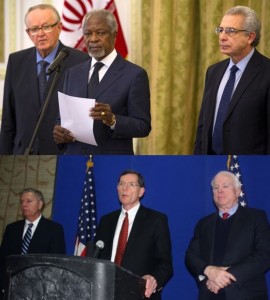Pakistan Facing Difficult Choice: Peace Talks or Military Action?
With mounting pressure from many sides, Pakistan is quickly approaching a decision point at which it must choose whether it prefers to pursue peace talks with militant groups or to take military action against them. The latest spectacular incident involved a splinter group of Pakistan’s Taliban executing 23 Pakistani Frontier Corpsmen who had been in custody since being captured in 2010. This killing has caused at least a temporary pause in the ongoing peace talks between representatives of the TTP and Pakistan’s government.
The Express Tribune brings us word of Prime Minister Nawaz Sharif’s reaction to the executions:
Prime Minister Nawaz Sharif on Monday condemned the execution of kidnapped soldiers by a Taliban faction, warning that the deaths could affect ongoing peace talks.
“Such incidents have an extremely negative impact on the ongoing dialogue aimed at promoting peace,” Nawaz said in a statement issued by his office.
A faction of the Tehreek-e-Taliban Pakistan (TTP) from the northwestern Mohmand district claimed on Sunday night that they had killed 23 paramilitary Frontier Corps members who were kidnapped in June 2010.
Sharif goes on to note that this is just the latest attempt to disrupt the peace talks:
Nawaz added that Pakistan “cannot afford such bloodshed” and lamented that previous attempts to start dialogue were “sabotaged whenever it reached an encouraging stage”.
So while this disruption of the talks is clearly the responsibility of the Mohmand splinter group of the TTP that carried out the executions, recall that the US disrupted the talks last November with a drone killing of the TTP leader the day before talks were to begin.
In its coverage of the executions, Dawn notes the decision that Pakistan faces:
Highly placed sources have said the military was prepared to launch a full scale operation against militant sanctuaries in North Waziristan.
Sources said the army was awaiting a green signal from the government, adding that a large number of troops were being dispatched to North Waziristan from various formations across the country.
Meanwhile, army formations were carrying out field firing and battle inoculation exercises which are being regarded as preparations of a possible operation.
The exercises were aimed as practice for troops in operating under real battlefield environment with live firing of various weapon systems, the Inter-Services Public Relations (ISPR) said.
Meanwhile, those who have been appointed to the negotiating group on behalf of the TTP are doing their best to get the talks going again.
Sadly, though, violent pressure on Pakistan’s government is continuing on many more fronts. Read more →

